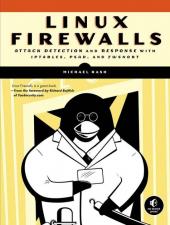"If you're building a Linux firewall and want to know what all the bells and whistles are, when you might want to set them off, and how to hook them together, here you go."
—;login (Read More)
"This admirable, eminently usable text goes much further than advertised."
—Linux User and Developer, Issue 77
"If you run one or more Linux based firewalls, this book will not only help you to configure them securely, it will help you understand how they can be monitored to discover evidence of probes, abuse and denial of service attacks. Readers of this book will gain an understanding of firewall log analysis and how the netfilter firewall can be dramatically enhanced with several open source tools."
—Ron Gula, CTO & Co-Founder of Tenable Network Security
"The book is easy to read, and chock full of attack vectors and subtle (and not so subtle) iptables configuration tips. This well researched book heightens an average system administrator's awareness to the vulnerabilities in his or her infrastructure, and the potential to find hardening solutions."
—Free Software Magazine (Read More)
"Right from the start, the book presented valuable information and pulled me in. Each of the central topics were thoroughly explained in an informative, yet engaging manner. Essentially, I did not want to stop reading. Rating: 9/10"
—Slashdot (Read More)
"One of the main reasons Linux Firewalls is a great book is that Mike Rash is an excellent writer. I've read (or tried to read) plenty of books that seemed to offer helpful content, but the author had no clue how to deliver that content in a readable manner. Linux Firewalls makes learning network security an enjoyable experience."
—Richard Bejtlich, Tao Security
"What really makes this book different from the others I've seen over the years is that the author approaches the subject in a layered method while exposing potential vulnerabilities at each step. (Thank you so VERY much.) So for those that are new to the security game, the book also takes a stab at teaching the basics of network security while teaching you the tools to build a modern firewall."
—InfoWorld (Read More)
"Linux Firewalls is a great resource. It provided insight and helpful information into additional tools to get the most out of iptables and to add in additional functionality."
—tuxmachines.org (Read More)
"If you or anyone you know is responsible for keeping a secure network, Linux Firewalls is an invaluable resource to have by your side. You will gain a better understanding of attacks, how to use iptables, PSAD, and fwsnort - all in an effort to properly defend and respond to attempted compromises."
—LinuxSecurity.com (Read More)
"Michael does a great job of explaining not just how iptables works, but he shows how users gain operational value from using open source tools and techniques, such as visualization, to analyze firewall logs."
—Raffael Marty, SecViz
The Art of Information Security interviewed Linux Firewalls author Michael Rash about network security and open source security tools. Read the interview here.

